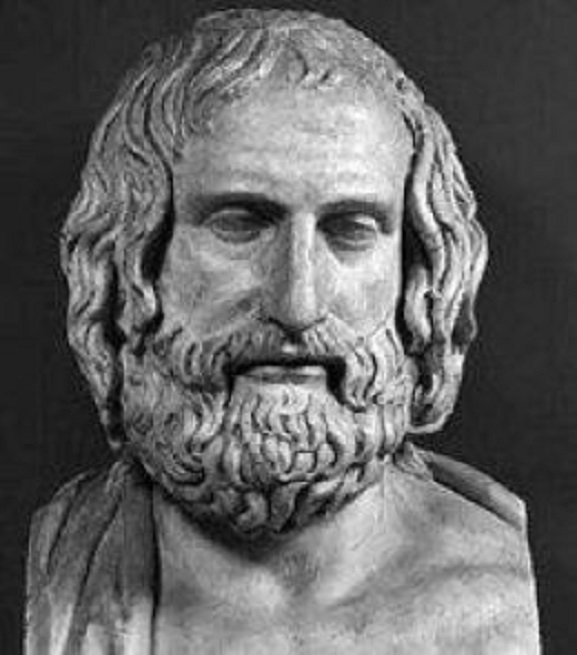History of philosophy. Anaksagor, Demokritus and the theory of atoms
Something of everything in everything
Another philosopher who does not want to be reconciled to the view that an essential substance, such as water, can be transformed into everything we see in nature is Anaksagor (500-428 BC). He rejected the notion that land, air, fire or water could turn into blood or bones, skin or hair.Anaxagoras believed that nature was composed of many small particles that can not be seen with the naked eye.Everything can be divided into even smaller particles, but even in the smallest of them is hiding something of everything. In fact, so is our body. If we remove a skin cell from the finger of the hand, the cell nucleus will comprehend not only the description of the skin itself. In the same cell is a description of the eyes, the color of the hair, and so on. Each individual cell in my body gives me a detailed description of the construction of all other cells, every cell has "something of everything". Therefore, we find the whole in the smallest particle. Anaxagoras called those smallest particles that contain anything, seeds or sprouts.
The theory of atoms
The last great naturophilosopher was Democritus (about 460 AD - 370 BC) He was born from the port city of Abdera on the northern coast of the Aegean Sea. Democritus maintained the thesis of his predecessors that it is not necessary for visible changes in nature to follow that something really "changes". That is why he assumed that everything should be made up of small invisible building units - something like bricks, each of which is eternal and unchangeable. He called these smallest particles of atoms. The word "atom" means "indivisible". It was important for Democritus to prove that everything from which everything was built can not be divided into even smaller parts. Because if atoms could infinitely split and split into ever smaller parts, nature would gradually dissolve as a very rare mess. It is important that these building blocks of nature exist forever - because nothing can arise from nothing. On this subject Demokritus agreed with Parmenides. He also considered all atoms solid and solid. But they could not be the same. Because if the atoms are the same, we would not have a reasonable explanation of how they combine in all sorts of forms: from poppy trees and olive trees to goatskins and human hair. There are countless different atoms in nature, Demokritus claimed. Some are smooth and smooth, some uneven and curved. And precisely because they are so heterogeneous in shape, they can be "assembled" into different bodies. Regardless of how many in number and in appearance, they are all eternal, unchanging and indivisible. When a body - like a tree or an animal - dies and falls apart, its atoms are scattered and can form new bodies. Because the atoms move in space, but they have different "hooks" and "linguists" and they are constantly coupling, creating the things we see around us. The only thing that exists is the atoms and the empty space that Democritus thought. Since he only believed in material things, we define him as a materialist. Democritus believed that for something to happen, there is a natural reason that lies in the very things. It is said how once he said he would rather find a natural law than become a king of Persia. The theory of atoms also explains our sensations. That we feel something is due to the movement of atoms in the empty space. If I see the Moon, it is because "lunar atoms" meet my eye.
But how is the matter of consciousness? It is hardly possible that it consists of atoms, of material elements! It was exactly the opposite of Democritus: the soul, he said, is composed of particularly round and smooth "soul atoms." When a person dies, the soul atoms are scattered in all directions. Then they can be lured to a new soul that is being formed at that moment. All this means that the human soul is not immortal. Many today share this mood. Like Democritus, they think that the soul is dependent on the brain, and when the brain ceases to exist, it is impossible to have consciousness in any form. With his teachings about the atoms, Democritus put a point on Greek naturophysiology for a while. He agreed with Heraclitus that everything in nature "flows" because the forms appear and disappear. But everything that flows is based on something eternal and invariable and it does not flow. That's exactly what the Demokritus say is the atoms.

Yet another fascinating post. I was particularly interested in reading about Anaxagoras (another discovery for me, thanks @godflesh) as his view reminds me of the concept of the holographic universe.
Awesome post. I enjoy reading philosophical articles because there lies the unique mindset of the wise. Looking forward to reading your piece about Socrates
To listen to the audio version of this article click on the play image.

Brought to you by @tts. If you find it useful please consider upvoting this reply.